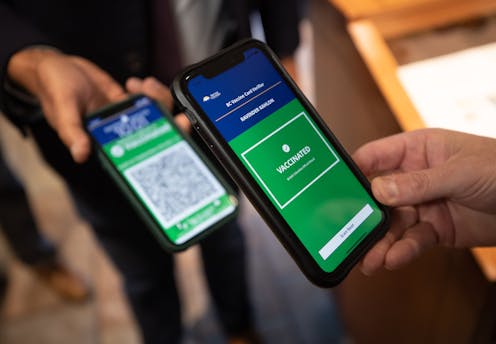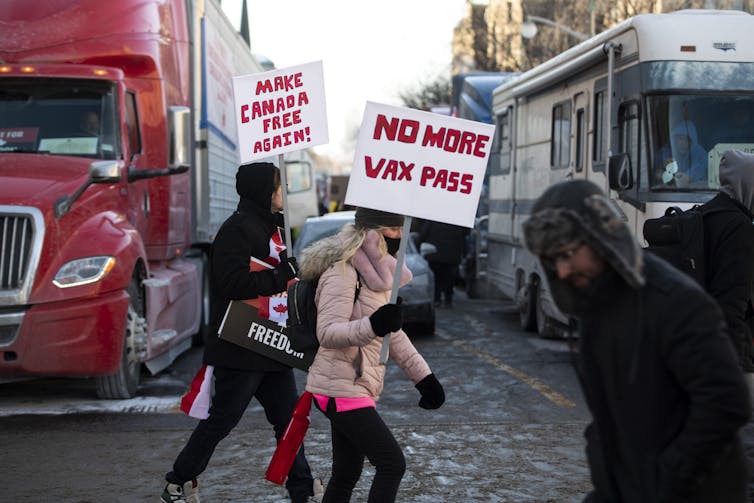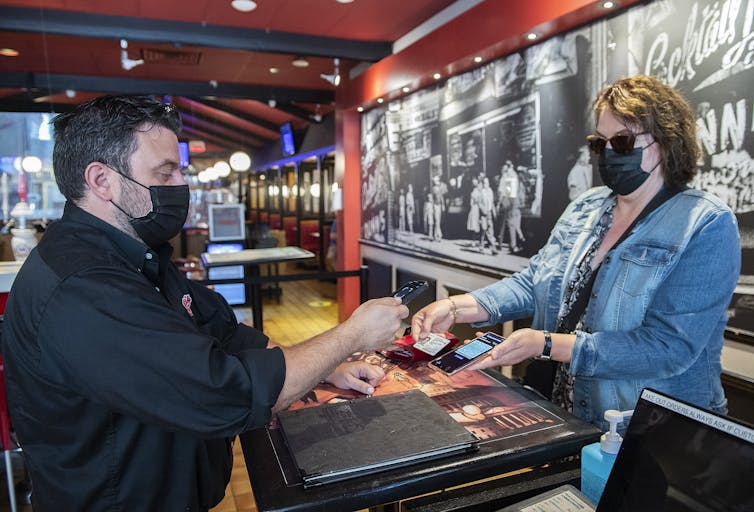
The simple idea of tracking and requiring proof of vaccination created some of the most disruptive protests in Canadian history, and the declaration of a national emergency.
How did this happen? It’s complicated.
It’s easy to forget that, at the outset of the pandemic, the initial lockdowns were extremely harsh and had a severe impact on economies and people’s lives. In attempts to mitigate these effects while protecting the health of populations, the idea of natural immunity passports was considered.
There were many scientific questions about this approach, including how to determine if someone was infected and how long immunity would last. And there were also important ethical questions to consider, such as creating incentives to be infected and creating a two-tier society.
This idea didn’t move forward for several reasons, not the least of which was because so few people had evidence of infection, for this approach to have any value.
Vaccine-induced immunity
Flash forward to the publication of the Phase 3 studies for the mRNA vaccines. The results were better than many expected: 95 per cent protection against symptomatic infection. The idea of proof of immunity was revisited, but this time it was vaccine-induced immunity.

However, the argument against it now was that if the vaccine was that effective, individuals wouldn’t need others to be vaccinated, if they were vaccinated themselves. Also, based on the transmission rate of the original strain of the virus, the herd immunity threshold was in the 60-70 per cent range, which was potentially achievable through voluntary programs.
The Delta variant changed this calculus and became the poster child for vaccine passports. Vaccine effectiveness dropped to the 70 per cent range against infection, and the herd immunity threshold increased to 90 per cent range, a target that would be challenging without mandates of some sort. Furthermore, the Delta variant was causing serious illness in broader segments of the population and hospitals. In particular, intensive care units were being overwhelmed.
Reluctant Conservative governments had no choice but to acquiesce to vaccine passports. When a federal election was called, this was a key platform issue of the Liberal party.
As a physician innovator in digital immunization records with expertise in health law, policy and ethics, I understood the challenges in balancing public health benefits with individuals rights and freedoms.
At that time, my thoughts were that the reason to have mandates was primarily for settings in which the virus could spread easily. During the Delta wave, stories of vulnerable essential workers contracting the virus in warehouses and meat packing plants and spreading it to their families who fell seriously ill, were terrible.
In my mind, you simply could not allow individuals to go to these high-risk settings unvaccinated. However, the broader application of the policy also resulted in increased vaccination rates, and helped control the Delta wave.
The spread of Omicron
The Omicron wave changed the story again. Omicron was milder, but more infectious. But more importantly, two doses of vaccine provided minimal protection against infection, although it did protect against serious illness and death.
The rationale for vaccine passports was now different. Herd immunity through vaccination alone was unattainable. If the goal was to prevent transmission to others, any mandate should be three vaccines which provide 60-70 per cent protection against infection. However, if the goal is to protect against serious illness then two doses provided reasonable protection, although this would be improved with a booster.

And here is where it gets complicated. People not wishing to be vaccinated could argue that an unvaccinated person was no more likely to become infected by Omicron than a two-dose vaccinated person.
Unfortunately, our fragile health-care system complicates this decision. Individuals getting seriously ill place strains on hospitals, health-care workers and have spillover effects, including the cancellation of medical procedures. And, as we saw with the “mild” Omicron wave, this triggers a lockdown which affects all of us.
Future policy
So where do we go from here? I think we will end on a middle ground for a potentially endemic virus. This could mean a policy already in use for health-care workers and the influenza vaccine: You don’t neccesarily have to be vaccinated, but if there are cases at work or at school, you and your child will be asked to stay home for your own protection. This may vary based on the risk to your demographic. Proof of previous infection may be also considered in these policies.
Vaccine passports did work. They increased vaccination rates, saved countless lives and reduced the duration of lockdowns, preserving parts of the economy.
But, as we have seen, these policies are highly divisive and are impacted by the changing science of the pandemic, which will require more targeted and adaptable approaches moving forward. And importantly, the messaging around these policies will need to change from penalizing the sub-optimally vaccinated to protecting them.
Kumanan Wilson is the Chief Executive Officer of CANImmunize Inc. Dr Wilson served as a member of the independent data monitoring committee for the Medicago COVID-19 vaccine trial. Dr Wilson has received funding from the Canadian Institutes of Health Research, the Canadian Immunity Task Force, the World Health Organization and the Bill & Melinda Gates Foundation. Dr Wilson is an internal medicial physician at The Ottawa Hospital, Professor of Medicine and Chair in Digital Health Innovation at the University of Ottawa, an innovation advisor at Bruyere Hospital and CEO of CANImmunize Inc. He is a member of the University of Ottawa Centre for Health Law, Policy and Ethics.
This article was originally published on The Conversation. Read the original article.







